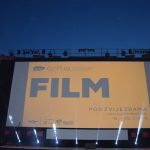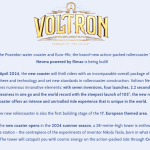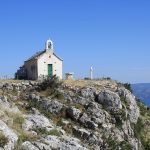March 18, 2019 – Bruno Langer is the bass player of Atomsko Sklonište (Atomic Shelter), a well known Croatian hard rock band from Pula. Learn more about Langer, the band, the famous musicians he’s collaborated with, the band’s legacy and its future in the interview below.
To begin, tell us something about your beginnings, what the scene in the former Yugoslavia looked like at the time? As far as I know, you had trouble choosing between boxing and music – can you tell us how you decided to play music in the end?
I was in the same generation of juniors as Mate Parlov, we trained together, and in 1965 we were supposed to compete at the Junior Championship of Yugoslavia in Apatin, Vojvodina – M. Parlov as a Light heavyweight, and I was a Middleweight. I had to decide whether I wanted to pursue boxing or rock’n’roll. I had already given up on fighting, and never again went to the training, so that I had quit even before the trip, and decided to pursue rock’n’roll. Later on, when the boys were jogging on the Monte Zara hill, I would play guitar for them.
Atomsko Sklonište (also known as Atomic Shelter in the UK and the USA), one of the most influential rock acts in this region, evolved from the band Bumerang, which changed its name to Atomsko Sklonište after Sergio Blažić and lyricist Boško Obradović joined the group. Your stage-presence was profoundly strange: barbed wire, umbrellas, torn-up clothes, Blažević’s act as an alienated man and Obradović’s lyrics about war, psychosis, and the end of civilization. Where did you get the inspiration for the band-name and stage-props, and were there any troubles regarding the censorship in the Communist regime during the Belgrade concert in ’91?
Sergio sang and I played bass in Bumerang, but only thanks to Obradović did Atomsko Sklonište come to be. Sergio and I teamed up with Dragan Gužvan, who is one of the best guitarists in the region if you ask me, drummer Saša Dadić, and keyboard-player Eduard Kancelar. It’s interesting to note that we all grew up on Monte Paradiso hill, except for Sergio, who lived in another part of town – Rude. Atomsko Sklonište was a multimedia, anti-war project. Obradović called me on the phone and proposed the name Atomsko Sklonište among many others. We hung out with poets, painters, artists. We gained recognition among Slovene photographers for our album artwork. The Slovene artist Kostja Gadnik is responsible for the cover-art of Atomska Trilogija.
As for the censorship during the Communist regime, there weren’t any problems regarding “unacceptable” songs, although we had songs like “Kinematograf Našeg Djetinjstva”, which criticized the state of affairs in the former state, but I would like to single out the song “Mutna Rijeka”, which is based on an actual event – the Militia threw a young man down from the second story of the nearby hotel Kontinental. I would also like to point out that the song features guest musician Mel Collins, the saxophone player of my favourite band, King Crimson. It was a real honour to me. When John Etchells brought him in, I was shaking because he was a world-famous musician.
Because our records were sold in Slovenia, which was liberal, by the RTV record company in Ljubljana (which was like a family to us), we didn’t have as much trouble with censorship and the “Shund-tax”. During the recording sessions for “U Vremena Horoskopa”, we used the biggest mobile-studio – the one The Rolling Stones and AC/DC used.
As for the ’91 Belgrade concert, it was called the Guitariad in Zaječar. There weren’t actually any problems. The airplane that we took from Belgrade to Ljubljana was the last one available from Belgrade, which inspired us to write the song “Posljednji let boing 707”. In Bosnia, the war started right after we played there, like in Savski Most, Jajce, Bihać – the war was right behind us wherever we went.
You have worked with many famous individuals, such as John Etchells, the producer of Queen, while Mel Collins, the saxophone player of King Crimson, was featured as a guest on the album “Mentalna Higijena”. Can you tell us more about that? What was it like to collaborate with such famous names, and is it true that you were the supporting band for Status Quo and Iron Maiden?
It’s true; we were supporting Status Quo, Iron Maiden, as well as Motorhead in ’98 – they even congratulated us after the show. As for Iron Maiden, that was at the concert on the Hypodrome ‘81’s Locomotive, Omega, a bunch of Yugo-bands, and we at the end. It’s interesting to note that ten years after that show, Iron Maiden remembered us and mentioned in one newspaper article that the “Atomics” kicked ass.
Concerning Etchells, we often worked with him. We were great friends before the war started because he and John Peel, a famous British radio DJ, were best men at their weddings, and would often play our songs on BBC 1.
What is your opinion about the past and future of rock’n’roll? Has it still got the same importance today as it did before, and does it even have a future as a music genre and philosophy?
I chose rock’n’roll at 15, meaning that I have played for almost 55 years. Rock’n’roll is one of the most beautiful experiences of the 20th century, especially the hippie movement because it has a positive message, which is less talked about, and I’m happy that I was a part of it.
As far as the future is concerned, I’m sorry that young bands don’t have enough opportunities for gigs, while turbo-folk is around every corner. Were it not for biker-gatherings, I think that the rock-scene in Croatia would be dead – kudos to the bikers! I especially feel bad after remembering what a force of nature rock had been during the ’80s.
And for the last question, what are your plans for Atomsko Sklonište? Will you release a new album, and will we see you in Solin?
It all depends on whether or not we’re going to see a new Atomsko Sklonište record. We as a band and me as a bassist received a prize from Želimir Babogredac because we belonged to Croatia Records for over 25 years. We haven’t been to Solin yet, but we were in Split a few times.
You can read the interview in Croatian here.
To read more about lifestyle in Croatia, follow TCN’s dedicated page.









